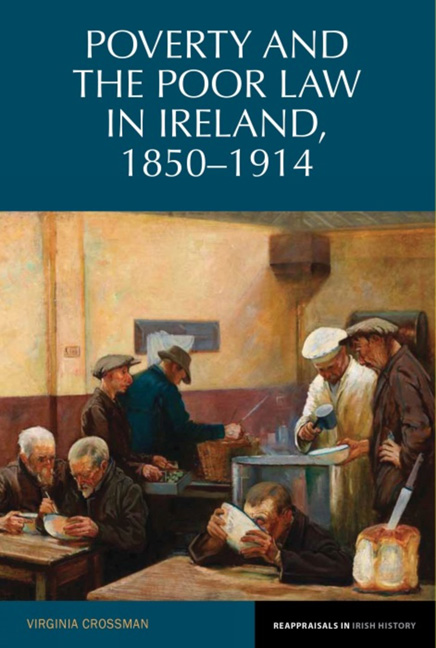Book contents
- Frontmatter
- Contents
- List of Figures
- List of Tables
- List of Maps
- Acknowledgements
- Introduction
- Chapter 1 Concepts of Poverty and Poor Relief
- Chapter 2 Context and Trends
- Chapter 3 Outdoor Relief
- Chapter 4 The Workhouse
- Chapter 5 The Sick, Infirm and Lunatics
- Chapter 6 Single Mothers and Prostitutes
- Chapter 7 Mendicancy and Vagrancy
- Conclusion
- Note on statistics and Sources
- Bibliography
- Index
Introduction
- Frontmatter
- Contents
- List of Figures
- List of Tables
- List of Maps
- Acknowledgements
- Introduction
- Chapter 1 Concepts of Poverty and Poor Relief
- Chapter 2 Context and Trends
- Chapter 3 Outdoor Relief
- Chapter 4 The Workhouse
- Chapter 5 The Sick, Infirm and Lunatics
- Chapter 6 Single Mothers and Prostitutes
- Chapter 7 Mendicancy and Vagrancy
- Conclusion
- Note on statistics and Sources
- Bibliography
- Index
Summary
The focus of this study is the poor law system, and the people who used it. Modelled on the English poor law of 1834, the Irish Poor Relief Act of 1838 established a nationwide system of poor relief based on the workhouse and financed by a local property tax. The poor law system remained the primary form of poor relief in Ireland until the 1920s, and in northern Ireland until after the second World War. From its inception, the poor law was the focus of criticism and complaint. As the author of an anonymous pamphlet published in 1857 declared, the poor law was ‘an acknowledged grievance, and complained of by all classes of the community, those who support it by the imposts levied on them, those who are forced to seek aid from it, and even the conscientious among the staff who are employed for, and so well paid to carry out the system’.
Accusations that the system was expensive, ineffective and pernicious were heard throughout the period of its existence. In 1886 the nationalist newspaper, The Nation, published an article by a workhouse physician lamenting ‘the deteriorating influence of workhouses’. He called for the poor law to be modified ‘in the direction of home relief’, which was less demoralising and more just to the deserving poor. This article was welcomed by a correspondent to the paper as highlighting ‘the glaring defects of this most expensive, ineffective and degrading system’. ‘Poverty in Ireland’, the writer claimed:
is condemned to starvation or imprisonment … no free people would tolerate such an unjust, cruel and costly system. It has been used as a political machine to effect purposes which are altogether outside the scope of Christian charity.
The political argument against the poor law was taken up the following year by the land campaigner and nationalist MP, Michael Davitt, who identified one of the most urgent tasks facing an Irish Parliament, as ‘the abolition, root and branch of the workhouse system’.
- Type
- Chapter
- Information
- Poverty and the Poor Law in Ireland, 1850–1914 , pp. 1 - 11Publisher: Liverpool University PressPrint publication year: 2013



